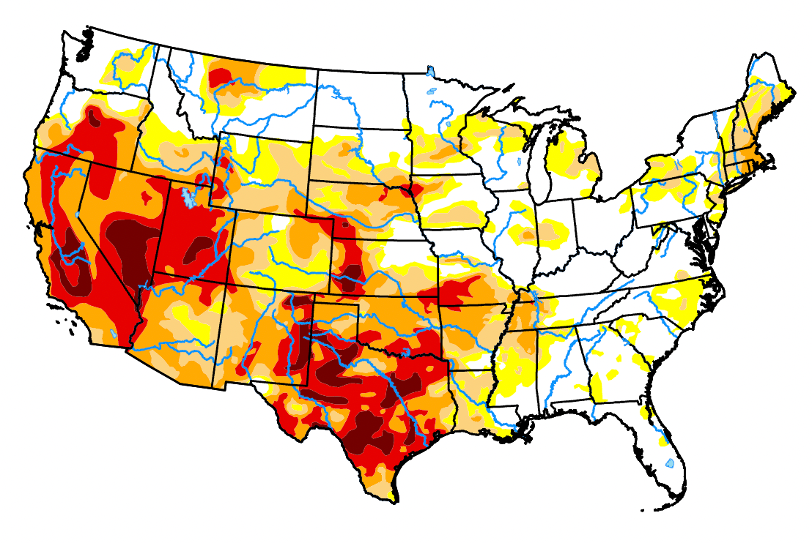Lawmakers are getting the ball rolling on another round of disaster assistance, even as much of the West and Plains are baking in drought,
Rep. Mike Thompson, D-Calif., and more than 20 colleagues have introduced legislation to make 2022 losses eligible for USDA’s Emergency Relief Program. USDA created ERP after Congress included $10 billion in a government funding bill last September to cover 2020 and 2021 losses. The new bill doesn’t specify a dollar amount.
“We are looking at any legislative vehicle that could contain this bill and pass, and the appropriations process is a good candidate again,” said Thompson. “I am committed to reauthorizing this program for hard hit growers.”
Thompson and Rep. Dan Newhouse, R-Wash., have asked USDA to say how much money it has on hand for disaster aid and how big the 2022 losses are likely to be.
In the Senate: The top Republican on the Agriculture Appropriations Subcommittee, John Hoeven of North Dakota, is monitoring the situation, his staff said.
USDA has made more than $6 billion in ERP payments so far on some 255,000 applications, according to the Farm Service Agency. Associate FSA Administrator Steve Peterson told sugar industry representatives this week that “drought is the No. 1 cause of loss” this year.
According to this week’s Drought Monitor, drought conditions have expanded in parts of the central Plains, Texas and upper Midwest due to dry weather.
Dems win over Sinema, clearing path for climate funding
Senate Majority Leader Charles Schumer announced Thursday night that Democrats had reached an agreement to pass their historic climate funding package. He said a new version of the bill, known as the Inflation Reduction Act, would be introduced Saturday. The Senate is scheduled to vote to bring up the bill for debate on Saturday afternoon.

“The agreement preserves the major components of the Inflation Reduction Act, including reducing prescription drug costs, fighting climate change, closing tax loopholes exploited by big corporations and the wealthy, and reducing the deficit by $300 billion,” Schumer said in a statement.
The last Democratic holdout - Arizona Sen. Kyrsten Sinema - said in a statement that she had cut a deal to remove a carried interest tax provision.
The bill, dubbed the Inflation Reduction Act, includes $20 billion in funding for climate-related agriculture practices, plus tax incentives and infrastructure funding for biofuels.
Senators clash over funding impact
The top Republican on the Senate Ag Committee, John Boozman of Arkansas, went to the Senate floor Thursday with his argument that using the reconciliation bill to fund conservation programs could make it harder to pass future farm bills. “If they go down this road, we very well might be looking at reconciliation as the only way that future farm bills are actually written,” he said.
But Ag Committee member Tina Smith, D-Minn., says in an interview for Agri-Pulse Newsmakers that the conservation money that’s in the IRA should make it easier to pass a farm bill in the next Congress. That’s because a significant funding need will have already been met, she says.
“When we put together the farm bill, we’re always sort of limited, we always have a hard time growing the pie … That’s why this is going to make it easier for us to come up with solutions that have good bipartisan support,” Smith said.
Newsmakers will be available today at Agri-Pulse.com.
Senate resolution would nullify Biden NEPA changes
In a largely symbolic vote, the Senate has formally disapproved of the Biden administration’s changes to the way the National Environmental Policy Act is implemented. The Biden action scrapped a large portion of changes the Trump administration had made to speed the review of major energy and other projects.
Forty-nine Republicans and Sen. Joe Manchin, D-W.Va., voted for a measure that would repeal the Biden action, but the measure has little chance of passing the Democratic-controlled House.
“It is critical for the administration to reinstitute these necessary NEPA reforms to speed up the approval process for much-needed infrastructure projects,” said Richard Gupton, senior vice president of public policy and counsel for the Agricultural Retailers Association.

Glyphosate demand boosts Bayer
The Bayer Group is raising sales growth estimates for its crop science division based in large part on projected increases in the sales of glyphosate herbicide products.
At the end of 2021, Bayer had estimated crop science sales would be up 7% for this year. Now, sales are expected to increase 13% this year, with glyphosate sales representing more than half of that, Crop Science Division President Rodrigo Santos said Thursday on an earnings call.
Don’t miss a beat! It’s easy to sign up for a FREE month of Agri-Pulse news! For the latest on what’s happening in Washington, D.C. and around the country in agriculture, just click here.
In the second quarter, crop science sales were up 17.2%, to about $6.6 billion over the prior-year period. Overall, Bayer Group sales were up 9.6% from the same period in 2021, to $13.1 billion, and earnings per share rose about 20%, to 98 cents per share.
Litigation update: Bayer CEO Werner Baumann continues to express confidence in the company’s litigation strategy, which the company estimates could cost as much as $16 billion. Baumann said 108,000 of 141,000 claims have been settled. He noted Bayer had won its last four state court trials over claims that Roundup exposure caused cancer.
USTR seeks comments on trade partnership with Kenya
The Office of the U.S. Trade Representative is seeking comments on the newly announced U.S.-Kenya Strategic Trade and Investment Partnership “as the two governments develop a roadmap” for the initial issue to be considered.
In a Federal Register notice published today, USTR says it will accept comments until Sept. 16. In the area of agriculture, USTR repeated what it said when the agreement was announced July 14, that the countries “will consider measures to facilitate agricultural trade and enhance transparency and understanding of the application of science- and risk-based sanitary and phytosanitary (SPS) measures.”
Kenya is gradually approving the planting of genetically engineered seeds, but still has in place a 2012 ban on imports of food and feed produced with the technology, Agri-Pulse reported last month.
She said it. “We should not get in the mindset of thinking that biofuels, ethanol and biodiesel, and advanced biofuels are automatically in competition with electrification … People are going to be directly driving liquid fuel-based vehicles for a long, long, long, long time,” - Sen. Tina Smith, D-Minn., on Agri-PulseNewsmakers.
Steve Davies and Hannah Pagel contributed to this report.
Questions, comments, tips? Email philip@agri-pulse.com.



![Steve headshot 250x200[1]](http://www.agri-pulse.com/ext/resources/Headshots/Staff-Photos/thumb/Steve_Headshot_250x200[1].JPG?1738947158)
